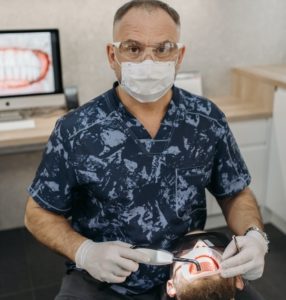
You Can Catch a Cavity?
While you may not be able to catch an actual cavity, you can definitely exchange bacteria with another person fairly easily. When you share drinks or food or kiss your loved ones, there’s a good chance that germs are transferred from one mouth to another. This is where the trouble can start.
The Trouble with Germs
We are all incredibly familiar with how easily germs spread, especially nowadays. But germs also contain bacteria, which means bacteria can also easily spread from person to person quickly. Bacteria is one of the main things that can cause cavities as they eat away at the protective enamel on teeth, causing decay. Every time you’re exposed to someone else’s saliva, you’re exposed to their bacteria too. Gross, right? Some common ways bacteria is transferred from one person to another, include:
Regular Dental Appointments Help
Children and people with compromised immune systems are especially susceptible to infection and cavities from bad oral bacteria. But by keeping regular appointments with your dentist in Livonia, you can help protect your smile from the dangers of bacteria. There are also some other things you can do to limit your chances of spreading bad bacteria from one person to another.
If it’s been more than six months since your last visit to your Livonia dentist, it’s time to schedule an appointment. Professional cleanings help reduce plaque and tartar, keep gums and teeth healthy, and allow your dental team to check for any possible signs of decay. If we happen to find anything, there are several things we can do to help, such as fillings.
We have dental offices in Ann Arbor, Canton, Farmington Hills, and Livonia and are always accepting new patients.

What Are Dental Veneers?
Veneers are thin shells of porcelain that can be bonded to the front of your teeth to improve your smile and bite appearance. They can cover up tooth discoloration, minor chips and cracks, unevenness, and slight gaps. Dental veneers are super durable and last for years with proper care. Veneers are custom-created for each patient, and the size, shape, and color are all individualized per person.
How Are Veneers Placed?
The treatment for dental veneers is usually quick, and can often be completed in two appointments. Your dentist in Farmington Hills will start by conducting a thorough exam to make sure your teeth are healthy and that veneers will give you the smile you’re looking for. Then, the preparation will begin.
In order to prepare for your veneer placement, your dentist will remove a small layer of enamel on the teeth that will be getting the veneers. Even though this may sound scary and painful, it’s a fairly quick and easy process. Once the area is prepped, you’re ready for placement.
To fix the veneers to the front surface of your teeth, your dentist will use a cement bonding agent. The bonding material is safe for teeth and will ensure that your new teeth will last a long time.
Potential Downsides
Veneers are a great cosmetic dentistry option for those looking to elevate their appearance. However, there may be some downsides to the treatment.
Be Cautious of Online Veneers
It is possible to find snap-on temporary veneers online, but we warn you to be cautious of their low price. These veneers are not a permanent solution and may even cause problems such as shifting of teeth, gum irritation, and recession, as well as make you more susceptible to decay if worn while eating. Veneers ordered online should be used cautiously, if at all. It’s always best to talk with your dentist about any type of dental treatment before taking the DIY approach.
If you’re ready to explore all of your cosmetic dentistry options, call your dentist to schedule an appointment today!
We have four dental offices in Ann Arbor, Canton, Farmington Hills, and Livonia to best serve our communities.

Candy is Ok… In Moderation
We know that all kids want to come home after a long night of trick or treating, dump their candy haul on the floor, and start chowing down on their favorite sweets. We’re not here to take that thrill away, but we do encourage you to help your child limit their candy intake. Starting on Halloween night, allow your kiddo to pick a few of their favorites to enjoy that day. In the days following, don’t let pails of candy sit out for easy picking. Instead, allow your child to pick a few pieces of candy to enjoy at a specific time of day to limit constant snacking and teeth’s constant exposure to sugar.
Drink Water
Drinking water during and after eating sweet foods can help wash away leftover sugars that could otherwise lead to cavities. But that’s not all. Water can also help neutralize plaque acid which can further protect teeth.
Brush Well, Brush Often
You already know how important it is for your kids to take excellent care of their teeth at home in between visits to their dentist in Ann Arbor. During holidays like Halloween, it’s even more important. Make sure your kids are brushing their teeth at least twice a day for a full two minutes each time. Kids under 8 may need help to make sure they’re cleaning their teeth properly. It’s also important to encourage your kid to brush their teeth after they snack on anything sugary, including their Halloween candy.
Trade In “Bad” Candy
There are some candies that are worse for teeth than others, and you may find it helpful to swap out these bad candies for something else. You can use money (a dime per piece, perhaps?), toys, or extra TV or electronics time. Consider trading in sticky, hard, or sour candy.
See Your Dentist in Ann Arbor
Cavities can be scary, but there are ways to prevent them. Sealants and fluoride treatments from your dentist can help protect teeth from scary sugar bugs. Make sure your kids are visiting their dentist regularly (at least every six months) to catch any problems early and get the preventive treatment they need to grow a happy, healthy smile.
If you’re looking for more tips on how to have a healthy Halloween, head over to the American Academy of Pediatric Dentistry (AAPD). They have tons of holiday-specific guides to help.
We’re always welcoming new patients at all of our dental offices in Ann Arbor, Canton, Farmington Hills, and Livonia.

Don’t Wait
It’s not uncommon for patients to hold off on using their dental insurance just in case something happens. However, this plan can backfire in a few ways.
Most dental insurance starts on January 1st and ends on December 31st. This isn’t always the case so make sure to check with your provider. However, this means that you must use your maximum allowance during those 12 months or you’ll lose it.
Patients usually pay for coverage either through their employer or on their own. Either way, dental insurance typically isn’t free. But if you pay for dental insurance and don’t use the benefits, your investment was wasted.
The best way to use your dental insurance benefits is to see your dentist in Canton at least every six months for professional cleanings, x-rays, and exams. These appointments can help catch problems early when they’re less expensive to fix and keep other big problems from happening.
Overlapping Treatment
Dental benefits don’t necessarily have to be used on preventive care alone. In fact, some patients choose to use their maximums to help cover the cost of transformative cosmetic dentistry, such as veneers, or restorative dentistry like dental implants or crowns. If that’s the case, you may be able to start treatment at the end of the year using this year’s benefits and finish at the beginning of next year using 2022 benefits. Your dentist can help you determine the best way to maximize your benefits on the treatment you desire.
Flex Savings Account
Even if you don’t have traditional dental insurance, you may have a Flex Savings Account (FSA) that you can use toward dental care. However, like dental insurance, FSAs often expire on January 1st, so make sure you use the money you’ve already invested.
Do you have unused dental benefits that will expire once the clock hits midnight on January 1, 2022? If so, schedule an appointment with your dentist in Canton today!
We have dental offices in Ann Arbor, Canton, Farmington Hills, and Livonia to better serve you.

Following wisdom teeth surgery, it’s crucial to follow your dentist’s instructions to promote healing and minimize discomfort. Below are some common tips, but it’s still wise to talk with your dentist in Livonia about your specific after-care instructions.
Minimize Bleeding
There will be some bleeding after having your wisdom teeth taken out. But don’t worry, this is completely normal. To help minimize the bleeding, apply pressure on your wound using clean gauze. The gauze may have to be replaced a few times daily, and it’s important that you wash your hands thoroughly beforehand to avoid introducing bacteria into your mouth.
Reduce Swelling
You may not notice much or any immediate swelling after surgery, and that’s normal too. Sometimes you won’t swell up for a day or two. But it’s still important to get ahead of it by using ice packs. Apply ice to the outside of your cheeks for 20 minutes, then remove it for 20 minutes. Make sure to wrap the ice in a t-shirt or thin towel so the ice pack is never in direct contact with your skin.
Eat & Drink Wisely
Your dentist in Livonia will recommend sticking with soft foods a few days following having your wisdom teeth removed. Food, such as oatmeal, warm (not hot!) soup, mashed potatoes, applesauce, or scrambled eggs are all good options. Also, make sure you drink plenty of water to keep yourself hydrated, just avoid sipping from a straw as this can cause damage to the surgical site.
When it comes to healing from wisdom teeth surgery, there are some things that you may normally do that you should avoid, at least for a little while.
Rinse Aggressively
While your dentist may recommend rinsing your mouth out with warm salt water a few times a day to reduce swelling, you should take it easy. Swishing too aggressively can cause more harm than good and may even cause you to start bleeding again.
Smoke
Not only does smoking require a sucking motion similar to drinking out of a straw, but it can also slow your healing. Smoking is also one of the main causes of dry socket, an infection that can cause serious pain for several days.
Exercise
This may be one of the few times you’ll hear a medical professional tell you not to exercise, but any type of strenuous activity such as exercise following wisdom teeth surgery can increase bleeding and swelling. You should do your best to limit exercise as well as heavy lifting for 3-4 days after surgery or until you’re cleared by your dentist in Livonia.
Wisdom teeth removal is an incredibly common procedure, but we understand that you may feel nervous. Talking with your dentist about any questions you have, as well as following their post-operative instructions, can relieve some of your concerns and get you healed up in no time.
We’re always welcoming new patients at our dental offices in Ann Arbor, Canton, Farmington Hills, and Livonia.

Avoiding Floss
Flossing is one of the most important parts of good dental care. However, one study showed that more than 45% of people floss only weekly, and 58% of people don’t floss at all! That’s a whole lot of missed bacteria that can increase the risk of cavities and other dental problems. In fact, when you don’t floss your teeth, you miss out on cleaning nearly 40% of tooth surfaces. This is why it’s so important to floss in between each and every tooth every day.
Snapping Your Floss
When it comes to flossing, there’s a proper technique that should be followed to not only clean your teeth but to do so in a way that doesn’t cause damage. One of the main things patients do that can cause damage is snap floss between teeth instead of gliding it gently in and out. While snapping floss might be a convenient way to get the floss in between each tooth, it can cause micro-tears in the gum tissue. Over time, these tears can lead to pockets of infection within the gums.
Brushing Then Flossing
It’s not uncommon for patients to floss after they brush their teeth. But research published by the Journal of Periodontology suggests that flossing then brushing may be the best way to remove plaque and bacteria. If you brush your teeth first and get a squeaky-clean mouth, then decide to remove bacteria from between teeth by flossing, you might just put bacteria from your mouth back onto your teeth.
Brushing Too Hard
Outside of flossing mistakes, there are some definite brushing mistakes that your dentist in Farmington Hills sees every day. One of the most common is brushing your teeth too hard. For best results, don’t brush with pressure, and there’s no need to scrub. Simply hold your toothbrush at a 45-degree angle and gently move it in circular motions over your teeth. This will thoroughly clean your teeth without damaging the enamel or gums.
Brushing Too Often
You should brush your teeth twice a day, ideally in the morning and before bed. While there may be times where you feel like you need to brush more, know that brushing too much can actually harm dental health by causing enamel erosion and leading to teeth sensitivity. Stick to brushing twice a day for two minutes each time.
Skipping Dental Appointments
Besides taking care of your teeth at home, you also need to see your dentist in Farmington Hills twice a year for preventive checkups and professional dental cleanings. Missing regular dental checkups not only puts your teeth at risk but can also increase your chances of developing gum disease.
It’s important to take care of your teeth in order to prevent dental problems such as cavities and gum disease. The best way to do that is by brushing properly twice a day, flossing thoroughly once a day, and seeing your dentist in Farmington Hills every six months. If you’re overdue for a dental appointment, schedule an appointment today!
We’re always welcoming new patients at our dental offices in Ann Arbor, Canton, Farmington Hills, and Livonia.

Bleeding While Brushing
According to The Academy of General Dentistry, bleeding gums can indicate damage in one or more tooth surfaces. While this may just be a sign of sensitivity, if you notice your gums bleed while you brush or floss, make an appointment with your dentist in Canton to rule out other possible causes. Early detection and treatment may prevent gum disease from progressing, so it’s important to take care of your teeth and gums at home between professional dental visits.
Swelling & Redness
One of the earliest warning signs of gum disease is swollen or red gums. If you notice swelling or a new redness in your gums, you may have gum disease. This is usually caused by plaque build-up at or below your gum line that has not been properly cleaned away. It’s important to see a dentist right away if you notice any changes in your gums. The longer you wait, the harder it becomes to treat periodontal disease because damage gets worse over time.
Pain & Sensitivity
While not every case of gum disease has pain, many people do experience painful gums as well as tooth sensitivity. Now, some people simply have sensitive teeth, so if that’s normal for you, there may be no cause for concern. However, if your teeth haven’t been sensitive to hot or cold before and the sensitivity lasts for more than a few days, you may have gum disease. Be sure to see your dentist right away.
Bad Breath
Nobody wants to experience bad breath, but it happens to everyone. Sometimes bad breath is caused by something we ate or drank and goes away on its own. However, other times bad breath is persistent and chronic. That’s when your dentist in Canton may become concerned. Chronic bad breath is often a telltale sign of gum disease thanks to the bacteria involved in the infection. These bacteria release a sulfur-like smell and make some people experience bad breath. If you’re not brushing and flossing your teeth after every meal, it’s much easier for food bits to become trapped in your mouth, leading to bacteria and plaque buildup and, you guessed it, bad breath and perhaps gum disease.
Visiting your dentist in Canton at least twice a year is crucial for maintaining good oral health and catching gum disease early. Visits like these are important because, while you can’t really cure gum disease, you can slow its progression if caught early enough. Visiting your dentist regularly will make it much easier to catch potential issues before they become major problems.
Welcoming new patients at all of our dental offices in Ann Arbor, Canton, Farmington Hills, and Livonia.

Even if you brush and floss your teeth every single day, there are just some things your daily oral hygiene routine can’t touch, such as tartar. You see, a sticky substance called plaque, which is made up of bacteria, collects around your teeth every day. If plaque isn’t thoroughly removed it will harden into tartar. This tartar needs to be removed from teeth regularly by a trained dental hygienist to keep it from causing problems like decay.
Cavities are perhaps the most common dental problem. While there are various causes of cavities, studies have shown that plaque build-up is one of the main reasons tooth decay happens in as many as 60% of adults by age 35. Without regular check-ups, small cavities can escalate quickly and cause even more problems. The best way to avoid cavities is to visit your Ann Arbor dentist every six months for a check-up and professional cleaning.
More than one-third of people who don’t see their dentist every six months have bad breath. Why? Essentially, the bacteria that cause bad breath can hide in and grow on your tongue, in between your teeth, as well as in the pockets between your teeth and gums. While brushing and flossing help remove some of these bacteria, it’s still crucial to get professional cleanings twice a year. If these bacteria are left untreated, you may experience bad breath and they may cause even more problems.
Patients who don’t visit their dentist regularly are at greater risk of developing gum disease. Gum disease is a serious infection of the gum tissue. It starts as gingivitis, but if it’s not treated quickly, it can quickly turn into periodontal disease. Regular dental visits help catch gum disease in the early stages when it’s reversible and before it has a chance to put you at risk for other major health issues. In fact, gum disease can cause complications such as heart disease and diabetes.
Another side effect of gum disease is tooth loss, but advanced decay can also cause someone to lose their teeth. Preventive dental checkups and cleanings can help protect your oral health from advancing to this serious level and help you keep your teeth for life.
We always encourage our patients to visit their dentist in Ann Arbor twice a year for checkups and cleanings, as well as any other necessary procedures. These visits are important to maintaining good oral and overall health. Regular visits also ensure that small problems are caught and treated before they become big ones. If it’s been longer than six months since your last dental visit, we welcome you to schedule an appointment with us today.
Accepting new patients at our dental offices in Ann Arbor, Canton, Farmington Hills, and Livonia.

Brush
First and foremost, you should brush your teeth twice daily. Your dentist in Livonia recommends brushing for at least two minutes per session. Use an ADA-approved toothpaste with fluoride, which is best at helping to remineralize and re-harden enamel and protect against tooth decay. If you smoke or drink coffee or tea regularly, it’s even more important to use ADA-approved toothpaste.
Floss
Flossing is an often forgotten part of a good oral hygiene routine, but it’s key to floss if you want to keep your teeth stain-free. Flossing your teeth removes pieces of food that can stain your teeth and put you at risk for tooth decay. It’s also been shown to reduce gingivitis, which is one of the causes of tooth discoloration.
Whiten
With so many different types of teeth whitening treatments on offer, it’s easy to feel overwhelmed by options. Fortunately, your dentist in Livonia is here with some basic truths that you can use to guide your decision-making. When it comes to smile-whitening products, it really comes down to two options: DIY strips and professional treatments.
Enhance
Some types of tooth staining won’t be reversed through brushing, flossing, or whitening. This is why it’s important to talk to your dentist before starting any smile whitening option. If the type of stains you have can’t be removed with the other options, you may be a candidate for certain cosmetic dentistry treatments. The most common version of cosmetic dentistry to help with staining is veneers. These porcelain slices are adhered to the front surface of teeth and cover up stains or other imperfections.
Visit
Most people visit their dentist to have their teeth cleaned, which is important for keeping teeth healthy. But in addition to cleaning your teeth, your dentist can also remove stains from tooth surfaces and even prevent new ones from forming. More importantly, removing stains helps prevent cavities and decay at a microscopic level where they cannot be seen by even our sharpest eyes.
If you’re looking for a brighter, whiter smile, talk with your dentist in Livonia to find the best solution for you.
Welcoming new patients at all of our dental offices in Ann Arbor, Canton, Farmington Hills, and Livonia.

Be Prepared to Combat Dry Mouth
Dry mouth, also known as xerostomia, occurs more frequently in seniors and can be caused by certain medications. Other causes include dehydration or hormonal changes that can occur with menopause. If untreated, dry mouth can lead to cavities, gum disease, and bad breath. While you should never stop taking the medication without discussing it with your doctor, there are some ways to relieve dry mouth – such as drinking plenty of water throughout the day, using special hydration rinses, and chewing sugar-free gum to stimulate saliva flow. You should talk with your dentist in Farmington Hills to find the best solution for you.
Get Used to Seeing The Dentist More Often
While we love seeing all of our patients, we tend to see our senior patients more often, and for a good reason. As we age, our mouths change. Due to decreasing production of saliva and a higher risk for tooth decay and gum disease, seniors may need more frequent dental care than other adults. Getting into a dentist’s chair at least once every six months will help you avoid some serious oral health problems. Regular visits will also let your dentist in Farmington Hills perform preventative treatments before problems ever occur.
Don’t Stop Brushing
Brushing your teeth correctly is important for everyone at every age, but it’s absolutely critical when you’re over 50. Seniors should be brushing their teeth at least two times per day and ideally after every meal. A soft-bristled toothbrush and a toothpaste containing fluoride are always best. Make sure to use just slight pressure as brushing too hard will cause unnecessary wear on your teeth and gums. Keep in mind that brushing properly can be hard for older people and can put them at risk for decay. Find a toothbrush that makes it easier in order to protect their teeth.
And Don’t Forget the Floss
Like brushing, flossing everyday is essential for everyone, but it’s especially important for seniors. The older we get, the harder it is to brush teeth effectively. Flossing helps dislodge plaque that would otherwise stay on your teeth and cause cavities and gum disease. If you don’t floss at least once a day, you’re missing out on cleaning 35% of your tooth’s surfaces! Sometimes flossing can also become difficult as we age and lose dexterity. If this is the case, talk to your dentist about other flossing options that can be easier to use.
According to many research studies, taking care of our teeth will only get more difficult as we age — that’s why it’s imperative that older adults take care of their oral health today. Senior citizens face many unique dental issues; while most don’t require immediate attention, ignoring them can have long-term consequences for your health. Schedule an appointment with your dentist today.
We’re always accepting new patients at all of our dental offices in Ann Arbor, Canton, Farmington Hills, and Livonia.